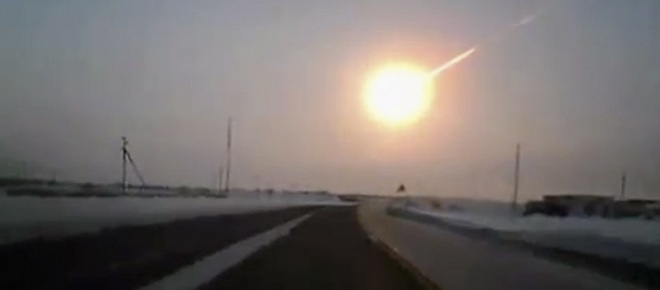Meteor strikes Russian sky as asteroid whizzes by
Tease the day: Russians were reminded today that you don’t need a Hollywood-style asteroid to inflict damage
In this frame grab made from a video done with a dashboard camera, on a highway from Kostanai, Kazakhstan, to Chelyabinsk region, Russia, provided by Nasha Gazeta newspaper, on Friday, Feb. 15, 2013 a meteorite contrail is seen. A meteor streaked across the sky of Russias Ural Mountains on Friday morning, causing sharp explosions and reportedly injuring around 100 people, including many hurt by broken glass. (AP Photo/Nasha gazeta, www.ng.kz)
Share

Remember that asteroid, 2012 DA14, that was going to pass perilously close to the earth? The big rock that was going to miss us by an astronomically minuscule 27,000 kilometres? Well, today’s the day. But this morning, as you eat your cheerios, odds are you won’t be reading about that particular asteroid. More likely, you’ll see pictures and videos from Russia, where a meteor exploded in the sky and injured hundreds of people. The dramatic scene demonstrates how much Hollywood’s portrayal of cataclysmic disaster hides the damage that can be done by what is, by comparison, a pebble from space.
The meteor that exploded weighed in at nine tons, apparently, and exploded dozens of kilometres above ground. But the rock hit the atmosphere at a stunning 54,000 km/h—or Mach 72.8, according to an online calculator that converts such numbers. The National Post re-printed a foreboding Slate column this morning that warned just how quickly asteroids approach, and how ill-prepared earthlings are to defend ourselves. “By the time we see the next bullet coming, it might be too late,” wrote Konstantin Kakaes. The Russian experience today suggests it won’t take a Hollywood-sized asteroid to wreak havoc. All that said, these powerful visitors from space—the most damaging among them, anyway—remain rare occurrences. Now, get back to your cheerios and don’t worry so much.
What’s above the fold this morning?
The Globe and Mail leads with extremists who, after being pushed away, now control an entrance to Benghazi, Libya. The National Post fronts South African Paralympic phenom Oscar Pistorius’ alleged murder of his girlfriend. The Toronto Star goes above the fold with Pistorius. The Ottawa Citizen leads with an RCMP officer and his wife on trial for repeated child abuse, including sexual assault. iPolitics fronts international tension at a G-20 meeting over appropriate monetary policy. CBC.ca leads with a meteor that exploded in the Russian sky, injuring hundreds. National Newswatch showcases a Michael Harris column at iPolitics about Prime Minister Stephen Harper playing fast and loose with facts.
Stories that will be (mostly) missed
| 1. Pay equity. As a result of a pay-equity settlement, 300 current and retired employees in the Auditor General’s office will receive back pay amounting to $1.5 million. | 2. Integrity commissioner. NGOs and the opposition are questioning the public service integrity commissioner’s current practice of not naming bureaucrats guilty of wrongdoing. |
| 3. Super watchdog. The Coalition Avenir Quebec wants several government watchdogs that root out corruption to unite under one roof and report directly to the National Assembly. | 4. Mining. Brazil won’t give the go-ahead for a Canadian-owned gold mine in the Amazon until the company behind the proposal proves it won’t endanger the surrounding people or ecosystem. |